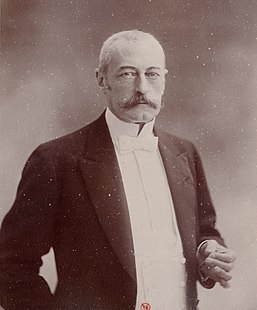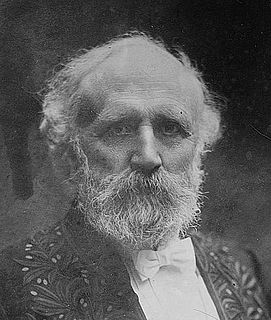
Pierre Marie René Ernest Waldeck-Rousseau was a French Republican politician, who served 29th Prime Minister of France.

Alexandre Millerand was a French politician and freemason. He was Prime Minister of France from 20 January to 23 September 1920 and President of France from 23 September 1920 to 11 June 1924. His participation in Waldeck-Rousseau's cabinet at the start of the 20th century, alongside the Marquis de Galliffet who had directed the repression of the 1871 Paris Commune, sparked a debate in the French Section of the Workers' International (SFIO) and in the Second International about the participation of socialists in "bourgeois governments".

Émile François Loubet was the 45th Prime Minister of France and later President of France.

The Radical-Socialist and Radical Republican Party was a liberal and social-liberal political party in France. It was also often referred to simply as the Radical Party, or to prevent confusion with other French Radical parties as the Parti radical valoisien, abbreviated to Rad, PR, or PRV.

The Radical Party of the Left is a social-liberal political party in France. A party in the Radical tradition, since 1972 the PRG was a close ally of the major party of the centre-left in France, the Socialist Party. After the 2017 presidential and legislative elections, negotiations to merge the PRG with the Radical Party began and the refounding congress to reunite the parties into the Radical Movement was held on 9 and 10 December 2017. However, a faction of ex-PRG members, including its last president Sylvia Pinel, split from the Radical Movement in February 2019 due to its expected alliance with La République En Marche in the European elections and plans to resurrect the PRG.
Liberalism and radicalism in France refer to different movements and ideologies.
The Cartel of the Left was the name of the governmental alliance between the Radical-Socialist Party the socialist French Section of the Workers' International (SFIO), and other smaller left-republican parties on two occasions between the World Wars. The Cartel des gauches twice won general elections, in 1924 and in 1932. The first Cartel was led by Radical-Socialist Édouard Herriot, but the second was weakened by parliamentary instability and was without one clear leader. Following the 6 February 1934 crisis, President of the Council Édouard Daladier had to resign, and a new Union Nationale coalition, led by the right-wing Radical Gaston Doumergue, took power.

Charles Camille Pelletan was a French politician and journalist, Minister of Marine in Emile Combes' Bloc des gauches cabinet from 1902 to 1905. He was part of the left-wing of the Republican, Radical and Radical-Socialist Party, created in 1902.
The Democratic Alliance, originally called Democratic Republican Alliance, was a French political party created in 1901 by followers of Léon Gambetta such as Raymond Poincaré, who would be president of the Council in the 1920s. The party was at first conceived by members of the Radical-Socialist Party tied to the business world who united themselves in May 1901 along with many moderates as gathering centre-left liberals and Opportunist Republicans. However, after World War I and the parliamentary disappearance of monarchists and Bonapartists it quickly became the main centre-right party of the Third Republic. It was part of the National Bloc right-wing coalition which won the elections after the end of the war. The ARD successively took the name Parti Républicain Démocratique and then Parti Républicain Démocratique et Social before becoming again the AD.
The Gauche Plurielle was a left-wing coalition in France, composed of the Socialist Party, the French Communist Party, the Greens, the Left Radical Party, and the Citizens' Movement. Succeeding Alain Juppé's conservative government, the Plural Left governed France from 1997 to 2002. It was another case of cohabitation between rival parties at the head of the state and of the government. Following the failure of the left at the 2002 legislative election, it was replaced by another conservative government, this time headed by Jean-Pierre Raffarin.
The Rally of Republican Lefts was an electoral alliance during the French Fourth Republic composed of the Radical Party, the Independent Radicals, the Democratic and Socialist Union of the Resistance (UDSR) and several conservative groups. Headed by Jean-Paul David, founder of the anti-Communist movement Paix et Liberté, it was in fact a right-of-center conservative coalition, which presented candidates to the June 1946, November 1946, and 1951 legislative elections.
The Popular Liberal Action, simply called Liberal Action, was a French political party during the French Third Republic that represented Catholic supporters of the Republic. It operated in the center-right, primarily to oppose the left-wing Republican coalition led by Pierre Waldeck-Rousseau and Émile Combes who pursued an anti-clerical agenda designed to weaken the Catholic Church, especially its role in education. The ALP between 1901 in 1914 had its best election in 1902, with 78 deputies. It built a nationwide newspaper and propaganda network, had excellent funding. There were 1200 local committees, with 200,000 dues paying members in 1906, Giving at the strong space of any French political party.

The European Democratic and Social Rally group, formerly the Democratic and European Rally group, is a parliamentary group in the Senate including representatives of the Radical Party of the Left (PRG) that historically consisted of radicals of both the left and right. Before 1989, the group was known as the Democratic Left group.

The Socialists and affiliated group is a parliamentary group in the National Assembly including representatives of the Socialist Party (PS).

Alexandre-Félix-Joseph Ribot was a French politician, four times Prime Minister.

The Left in France was represented at the beginning of the 20th century by two main political parties: the Republican, Radical and Radical-Socialist Party and the French Section of the Workers' International (SFIO), created in 1905 as a merger of various Marxist parties. But in 1914, after the assassination of the leader of the SFIO, Jean Jaurès, who had upheld an internationalist and anti-militarist line, the SFIO accepted to join the Union sacrée national front. In the aftermaths of the Russian Revolution and the Spartacist uprising in Germany, the French Left divided itself in reformists and revolutionaries during the 1920 Tours Congress, which saw the majority of the SFIO spin-out to form the French Section of the Communist International (SFIC). The early French Left was often alienated into the Republican movements.














